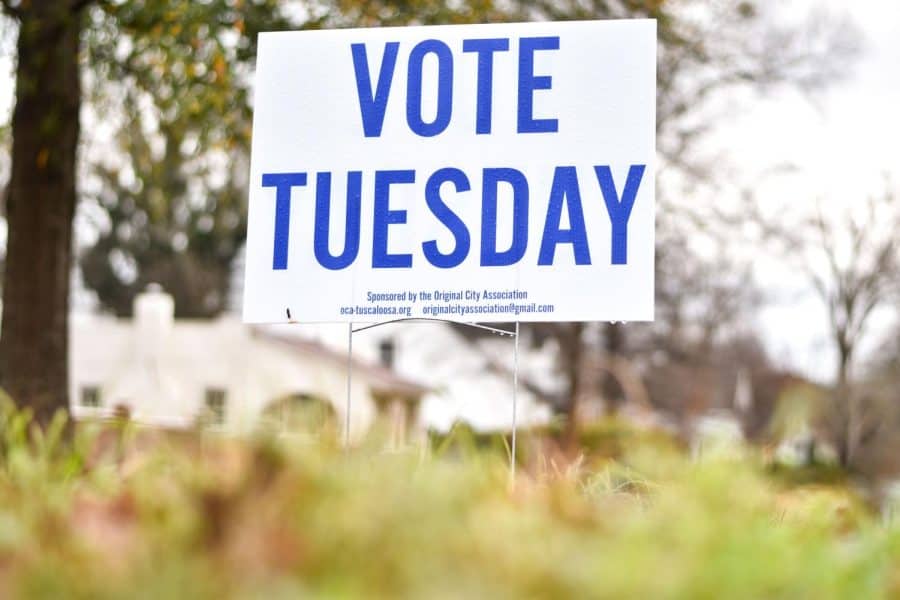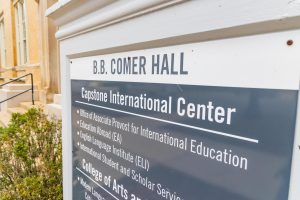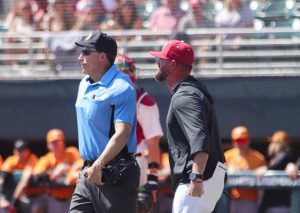Tuscaloosa City Council votes to postpone elections until May
January 19, 2022
The Tuscaloosa City Council is seeking approval to change the date of municipal elections following multiple battles about the legality of student voting.
If approved by the Alabama Legislature, municipal elections will take place on the third Tuesday of May beginning in 2025.
The item was last on the list in a resolution establishing Tuscaloosa’s 2022 legislative agenda, which was unanimously approved by the city council on Dec. 21.
“This is the culmination of something that’s been talked about off and on,” District 4 Councilman Lee Busby said in a Dec. 21 precouncil briefing. “It’s aimed primarily at addressing a problem we have with votes that can’t be legally sustained.”
The decision drew criticism from members of political groups at The University of Alabama who said changing the election date would impact student involvement in future municipal elections.
“This proposal would effectively decrease the number of registered voters likely to cast a ballot in municipal elections,” the student organization UA Vote Everywhere said in a statement. “Particularly targeting students at the University of Alabama, Stillman College, and Shelton State who are registered to vote in Tuscaloosa but, by the end of May, will have left town after final exams to visit home, travel, or pursue internships elsewhere.”
Busby explained in the late December precouncil briefing that municipal elections occuring during the third week in May was intended “to acknowledge the period where most of the part-time, temporary folks are out of town.” He expressed confidence that changing the date of the municipal election would not “preempt or preclude” legally sustainable votes.
Sam Badger, a member of UA College Democrats who campaigned for Tuscaloosa’s District 5 City Council seat in 2021, described the decision as “a very transparent attempt to keep college students out” of participating in municipal elections.
“It’s quite offensive to me, especially, because I ran for office,” Badger said. “I knocked on doors, I did all that stuff. And now it seems they’re pulling the rug out from under any students who want to get involved in local politics.”
The resolution was proposed to address questions about election security that have persisted since a contested 2013 Tuscaloosa City Board of Education election, which saw University alum Cason Kirby gain the District 4 seat over incumbent Kelly Horwitz.
In a lawsuit challenging the election results, Horwitz alleged that “offers to bribe, bribery, intimidation or other misconduct” contributed to Kirby’s win. Reports of illegal voting activities during the 2013 election included 10 individuals registered to vote at a single address, and sorority and fraternity members being offered free alcohol to vote for Kirby.
After Horwitz’s case was dismissed in the Tuscaloosa County Circuit Court, the Alabama Supreme Court granted Horwitz’s appeal in a 7-2 ruling, stating that 159 ballots should have been rejected in the 2013 election on the basis of unfulfilled residency requirements.
The date of municipal elections was changed to the first Tuesday of March following approval by the Alabama Legislature in 2015 in an attempt to curb future election security issues.
During a 2019 District 4 special election, poll workers reported an influx of college students during the late hours of the voting period. Of the district’s more than 6,000 voters, 4.7% participated in the special election, which resulted in Busby winning his city council seat with 60.6% of the votes.
The impact of Horwitz v. Kirby
Busby said the decision to change the date of Tuscaloosa’s municipal elections was influenced by the ruling in Horwitz v. Kirby.
In a 2019 op-ed for The Crimson White, Horwitz explained the court’s decision and called for election security.
“It is not enough, the court said, for a student to physically reside in Tuscaloosa to be able to legally vote in a municipal election,” she wrote.
The court’s ruling states that the legality of students voting in municipal elections depends on if the voter intends to permanently reside in the community.
According to the court, where a student receives grades and the address on the student’s driver’s license expresses permanent residency.
UA Vote Everywhere expressed concern about the effect of student disenfranchisement if the Alabama Legislature approves the city council’s proposal.
“A sizable portion of Tuscaloosa residents — students who participate in the Tuscaloosa economy, community events, and contribute to the city in a variety of ways — would no longer have the right to vote in elections that impact them as much as their neighbors.”
UA College Republicans did not respond to two requests for comment.
Questions? Email the News desk at newsdesk@thecrimsonwhite.com.




















